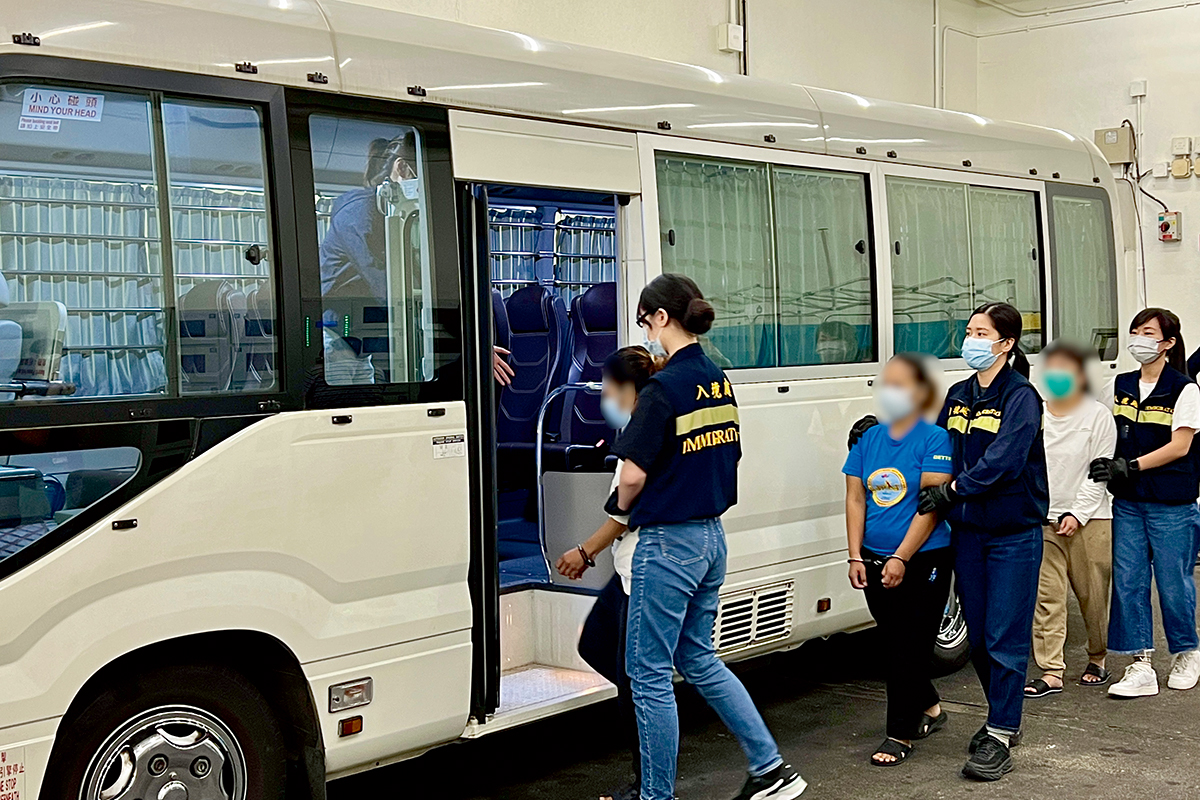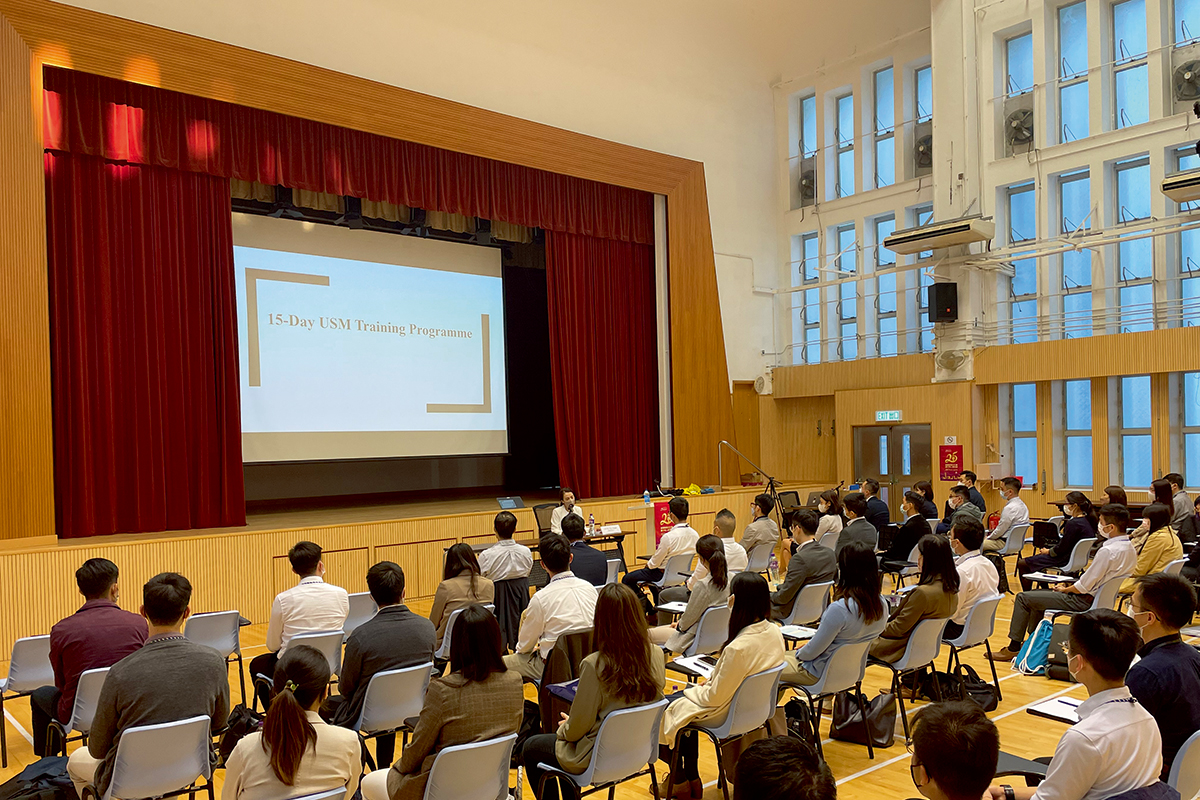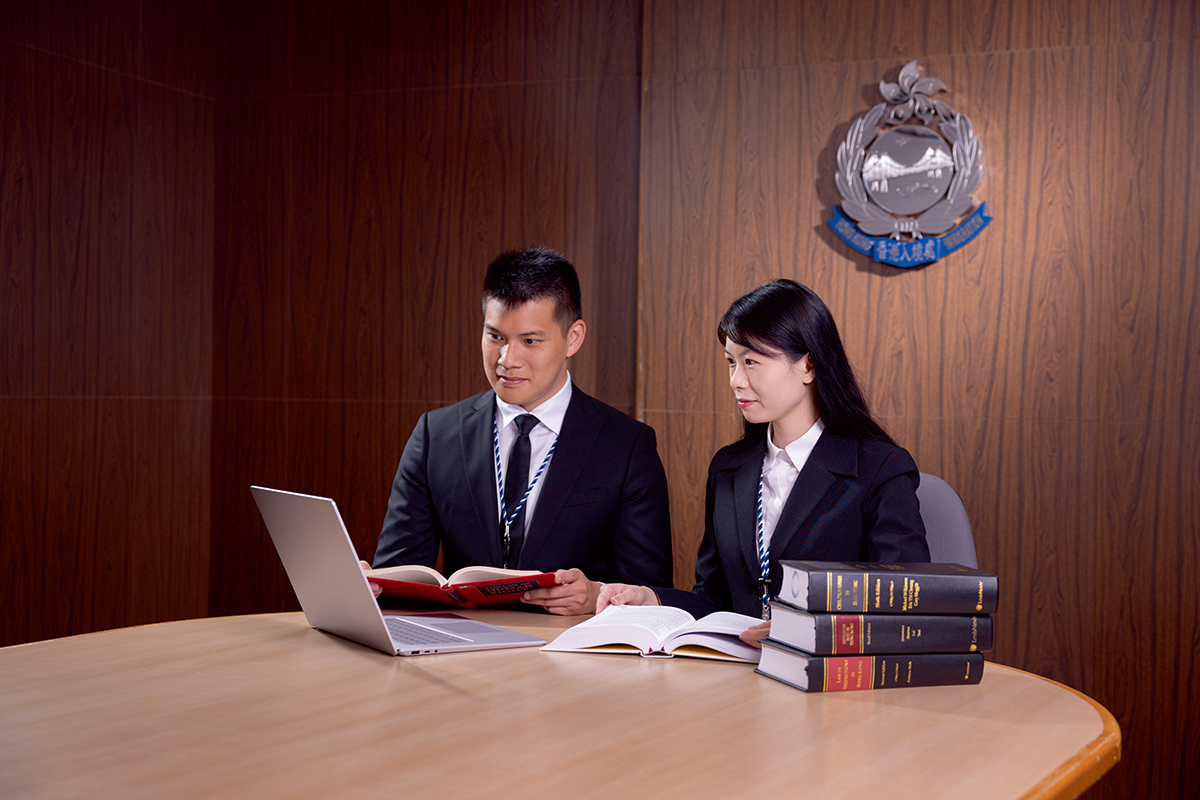





The Removal Assessment and Litigation Branch, established in June 2016, oversees the Removal Assessment and Litigation Division. The branch and its division are under the command of an Assistant Director and a Principal Immigration Officer respectively.
The Removal Assessment and Litigation Division is responsible for screening claims for non-refoulement protection on all applicable grounds1 lodged by persons not having the right to enter and remain in Hong Kong. The division also provides support for the government's comprehensive review of the strategy for handling non-refoulement claims, handles appeal/petition and litigation cases relating to non-refoulement claims and enforcement, and formulates and implements measures in respect of deportation and removal of unsubstantiated non-refoulement claimants.
Illegal immigrants, overstayers or persons refused entry by the department upon arrival in Hong Kong do not have legal status to remain in Hong Kong. For effective immigration control and public interest, they should be removed from Hong Kong in accordance with the Immigration Ordinance as soon as practicable.
Pursuant to a number of court rulings, if a person to be repatriated to another country claims that he would face risks of torture, violation of his absolute and non-derogable rights under the Hong Kong Bill of Rights (HKBOR), or persecution if so repatriated, then the department must withhold the claimant's repatriation to that country until his claim is finally determined as unsubstantiated through procedures meeting 'high standards of fairness'.
To fulfil its obligations under the United Nations Convention against Torture and Other Cruel, Inhuman or Degrading Treatment or Punishment, the HKBOR and the Immigration Ordinance, and to execute the relevant court rulings, the government introduced the Unified Screening Mechanism (USM) in March 2014 to determine non-refoulement claims on all applicable grounds. The USM is implemented in accordance with the statutory procedures under Part VIIC of the Immigration Ordinance, which were passed into law by the Legislative Council in July 2012 following its detailed scrutiny and came into effect in December 2012.
Under the USM, claimants are provided with reasonable opportunities to establish their claims, including stating relevant details on a non-refoulement claim form and attending a screening interview. After assessment, the department will inform the claimants of its decision and reasons in writing. Claimants aggrieved by the department's decision may lodge an appeal with the statutory and independent Torture Claims Appeal Board/Non-refoulement Claims Petition Office (Appeal Board).
Throughout the screening process, claimants are also provided with all necessary professional assistance, including publicly-funded legal assistance (PFLA), interpretation/translation services provided by qualified persons, and medical examination if the alleged physical or mental condition of a claimant is in dispute and relevant to the claim.
At the initial stage of implementation of the USM, in view of the significant rise in claims lodged through illegal entry, overstaying and being refused permission to land at control points, the government commenced in early 2016 a comprehensive review of the strategy for handling non-refoulement claims, and has implemented a series of measures to tackle the issue, including preventing potential claimants from entering Hong Kong, expediting the screening of pending claims, processing of appeals lodged by unsubstantiated claimants and their removal from Hong Kong, and stepping up enforcement against unlawful employment. In addition, the Immigration Ordinance was amended in 2021 to further enhance the efficiency in screening, prevent delaying tactics deployed by claimants, improve the procedures and functions of the Appeal Board, and step up the interception at source, enforcement, removal as well as detention of claimants, etc.
Notwithstanding the positive outcomes achieved through the above measures, there remain many challenges ahead in tackling the issue of handling non-refoulement claims. As at the end of 2022, there were around 14,900 claimants remaining in Hong Kong for different reasons. To ease the burden on society brought by the continued presence of a large number of non-refoulement claimants, the government has further implemented enhanced measures since December 2022 to strengthen the handling of non-refoulement claims and expedite the removal of unsubstantiated claimants from Hong Kong, which include maintaining high efficiency in screening non-refoulement claims; expediting the processing of claim-related appeals; updating the removal policy to expedite repatriation of unsubstantiated claimants from Hong Kong; expanding detention capacity and stepping up management of immigration detainees; and strengthening enforcement actions against immigration offences and illegal employment. The department will continue to follow up on the implementation of the above enhanced measures to ensure the smooth operation of the USM, the efficient screening of outstanding claims, the effective support to the handling of appeals and relevant litigations, as well as the expeditious removal of unsubstantiated claimants.

Removees being escorted by ImmD officers to proceed from place of detention to the airport.

All case officers responsible for screening non-refoulement claims are required to attend professional training courses before assuming their duties. Part of the 2022 professional training course has been simultaneously conducted locally and overseas by means of video conferencing.

To ensure that case officer has sufficient knowledge to process the cases and be familiarised with the relevant legal procedures, the department provided legal reference materials on the latest local and overseas jurisprudence for reference.

The department had established a database on information such as localities, reports of topical issues and details of major events of the source countries of claimants to facilitate the screening of claims.
To enhance the workflow, the department had introduced various measures within the existing legal framework, which included advanced scheduling of screening interviews, building an objective, credible and timely updated database on relevant source countries to enhance the capability and efficiency of handling cases, and deploying dedicated officers to handle claims involving claimants from the same country so as to expedite the screening of claims. In 2022, the average handling time for each case was about 10 weeks. From the commencement of the USM in March 2014 to the end of 2022, the department received a further 22,805 claims excluding 6,699 claims pending screening at the beginning. During this period, we determined 22,180 claims, including 269 substantiated claims (among which 180 claims were substantiated at the appeal stage), together with 7,123 claims withdrawn, bringing the total number of claims pending screening down to 201.
Due to the special work arrangements implemented during the Coronavirus Disease 2019 (COVID-19) pandemic, the commencement of screening procedures was hindered. Coupled with an increase in the number of new claims received, the number of new claims pending screening by the department rebounded to about 1,500 in mid-2021. With the department's vigorous efforts, the number of claims pending screening was brought down to 201 as at the end of December 2022.
With the amendment of the Immigration Ordinance in 2021, the department is equipped with more tools to ensure that the screening procedures are efficiently conducted and to prevent delaying tactics deployed by some claimants. The department will continue to maintain high efficiency in the screening procedures and aim to commence screening as soon as a new claim is received.
The government had implemented the 'Pilot Scheme for Provision of Publicly-funded Legal Assistance for Non-refoulement Claimants' since September 2017, running in parallel with the 'Legal Assistance Scheme for Non-refoulement Claimants' provided by the Duty Lawyer Service. The government would timely adjust the capacity for handling PFLA cases according to the number of non-refoulement claims received. As at the end of December 2022, the ceiling of the PFLA quota was 13 cases per day.
To better support the screening process, the department provides interpretation service to claimants throughout the screening process. The department hires in-house translators and interpreters mainly to provide interpretation support for claimants during briefing sessions and screening interviews, and to translate documents submitted by claimants. In addition, the department would hire, on a case basis, part-time non-government interpreters where necessary.
The Immigration Ordinance empowers the department to detain persons pending the determination of non-refoulement claims and/or removal proceedings. The exercise of such power must conform to the Hardial Singh principle in common law, which states that a person cannot be kept detained if the screening of non-refoulement claims or removal proceedings are impossible to be completed within a reasonable period of time. As part of the comprehensive review, the government has all along been exploring different options to expand the detention capacity so as to facilitate removal actions by the department more efficiently. The government will continue to consider various measures to better support the management of detention facilities in the light of legal, resource and public security implications, etc.
The department has all along been committed to removing unsubstantiated non-refoulement claimants from Hong Kong as soon as practicable in accordance with relevant prevailing laws and policy so as to maintain effective immigration control and to safeguard public interest. Despite some disruption to international flights due to the COVID-19 pandemic, the department had endeavoured to effect repatriation through, among others, close liaison with governments of major source countries of claimants, airline companies and other government departments for issuing travel documents for the return of unsubstantiated claimants and for arranging repatriation flights so as to enhance the overall efficiency in removal operations. In 2022, a total of 1,097 non-refoulement claimants were removed from Hong Kong, representing a substantial rise of 46% as compared to 2021. With the gradual resumption of international flight connections and phasing out of the epidemic control measures by major source countries of claimants, the department will continue to step up its removal efforts.
A rejected claimant may lodge an appeal, which would be considered by the Appeal Board.
There are designated sections under the Removal Assessment and Litigation Branch responsible for providing support to the Appeal Board to handle the appeals lodged by the claimants and the related judicial reviews, as well as civil litigation cases relating to removal and deportation, and claims for damages relating to detention.
1 Applicable grounds include risks of torture under Part VIIC of the Immigration Ordinance (Cap. 115, Laws of Hong Kong); risks of absolute and non-derogable rights under the Hong Kong Bill of Rights (HKBOR) as set out under the Hong Kong Bill of Rights Ordinance (Cap. 383, Laws of Hong Kong) being violated (including right to life under Article 2 and torture or cruel, inhuman or degrading treatment or punishment under Article 3 of the HKBOR); and risk of persecution with reference to the non-refoulement principle under Article 33 of the 1951 Convention Relating to the Status of Refugees.